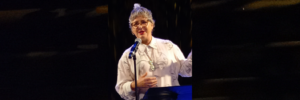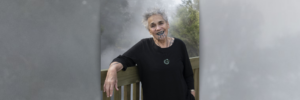
Lauren Keenan (Te Āti Awa ki Taranaki) is a writer of creative non-fiction, novels, short stories and popular psychology. Lauren was a winner at the 2017 Pikihuia Awards for Māori writers and a finalist in the 2019 awards. She was also a participant in Te Papa Tupu mentoring programme. Her short stories have appeared in Huia Short Stories collections in 2015, 2017 and 2019, and in 2020 her book The 52 Week Project was published. Amorangi and Millie’s Trip through Time was published in 2023, which has been a huge success in schools and was also a finalist in the NZCYA awards. This month, Lauren launched her new pukapuka, The Space Between, now available in all bookstores.
What are your hopes or dreams for each of your books?
My biggest hope is that a generation of children grow up with a greater understanding of Aotearoa New Zealand history. Then, in turn, this knowledge manifests itself as more tolerance for diverse voices, cultures, and stories. I also want to show Māori kids they can be the main characters in exciting books. Also, that they can write them themselves.
Then – a movie! Starring awesome people with an epic soundtrack. I may have spent lots of time already dreaming about what the music would be.
What tikanga or kawa do you apply to your writing process?
I am very reluctant to write Māori stories that sit outside my own iwi. I know that some people do this and it works out fine (nor do I judge them), but I have a deep nervousness about it. Possibly because I don’t think I could do it with any authenticity.
What do you think your mokopuna will think of your book Amorangi and Millies’ Trip Through Time? What will their reactions be?
I love this idea! I hope that it captures their imagination and teaches them about their own tupuna. I hope my future mokopuna get to read it one day.
You are a well-known graduate of the Te Papa Tupu Programme. What was the experience like for you and how impactful has that been on your career as a writer?
The Papu Tupu Programme was the single most important thing I could have done as a new writer. Before I was accepted on the programme, I’d had one short story published and written a couple of (mediocre) novels, but still felt like a real egghead calling myself a writer. So I didn’t. Writing was just this hobby I did in my own time and didn’t really tell people about as I felt too shy. Te Papa Tupu changed that. It gave me so much – the most important thing being confidence. It was that confidence that propelled me to feel less awkward about sharing my stuff. It also introduced me to other writers – I’d never met any before then. All of a sudden my solitary hobby felt so much less lonely. I’ll be forever grateful for having been part of the programme.
What advice would you give to other writers considering applying for Te Papa Tupu?
I’d say – just do it! Also make sure you’re ready to give your manuscript the focus it’ll need – which will be a lot. Editing is never easy and like many such things you really do get out what you put in.
Your short stories have appeared in Huia Short Stories collections in 2015, 2017 and 2019 as finalists and winners – ka rawe! What tips do you have for emerging writers who may be considering entering for the first time?
Short story competitions are one of the best ways to find your feet as a writer because they have a deadline (and with deadlines comes focus!) and are less daunting than an actual book. They’re also a great medium to trial different voices and plot ideas, so a really good thing to start with. The short story I had published in Huia 11 (2015) was my first ever thing published so is pretty special to me.
What projects are you working on now or hope to be working on in the future?
I’m a bit like a dog chasing squirrels with my writing. I’ve got my second middle-grade time travel book coming out next year – this one takes my young heroes to the New Zealand Wars and the Tarawera eruption, as well as lots of other exciting places. I’m also halfway through the third in the series, which is about World War Two. Apart from that, I’m currently editing two novels for adults – one crime fiction, and one historical fiction. I have so many ideas for books the challenge is sitting in one project long enough to finish it before rushing off into the next one.
One day I’d like to write a book with intergenerational poverty being a key theme. But I haven’t found the right voice for that one yet.




